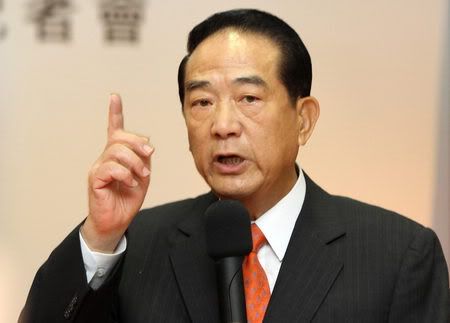By: inoljt, http://mypolitikal.com/
In an important world event that far too few Americans knew or probably cared about, Taiwanese President Ma Ying-jeou was recently re-elected with 51.6% of the vote.
The election itself was quite interesting; there are several fascinating patterns that occur in Taiwanese politics. But this post will focus mainly on the travails of third-party candidate James Soong Chu-yu.
More below.
In America third-party candidates generally do terribly. Amazingly, there is not a single Congressman in the House of Representatives who is not a member of either the Democratic or Republican Party.
There is a very simple reason for this: American politics is based on a first-past-the-post system, rather than a proportional parliamentary system. Whoever gets the most votes wins.
This represents a tremendous hurdle to third-party candidates in the United States. Since the supporters of a third party would otherwise vote disproportionately for another major party candidate, third party candidates are constantly accused of “stealing” votes. A vote for Ralph Nader is a vote for George W. Bush, or so the saying goes (and, as it turned out, a vote for Ralph Nader was indeed a vote for George W. Bush). This is why a third-party candidate has never won a presidential election in the history of the United States.
In Taiwan, whoever gets the most votes also becomes president. Third party candidate James Soong Chu-yu’s positions generally leaned towards the Kuomintang. He was unsurprisingly accused of siphoning votes away from the Kuomintang candidate Ma Ying-jeou. Soong thus faced the same hurdle that all third-party presidential candidates in the United States have failed to overcome.
So how did James Soong Chu-yu do? Well, in the earliest summer 2011 polls Soong generally pulled in low double-digits, sometimes breaking the 15% barrier but never falling below 10% of the electorate’s support. As the campaign season wore on, however, his support steadily leaked away. The polls document this drip, drip, drip of support fleeing him quite well. By October Soong was dipping into the single-digits. By November he was struggling to break into the double-digits at all. The last five polls on Wikipedia’s list gave him 7%, 5.8%, 7.2%, 6%, and 6.8% of the vote. Due to Taiwanese laws, polling then ceased during the ten days prior to the election.
On election day James Soong Chu-yu got 2.8% of the vote.
In other words, a candidate who started regularly polling above 15% ended up with less than a million actual votes. James Soong Chu-yu essentially turned into a non-entity; as the possibility of him splitting the Pan-Blue coalition vote came closer and closer to reality, his support plummeted.
All in all, this result is a fascinating application of an electoral principle being applied to a country outside the United States (or outside of the Western world for that matter). When electorates in the United States and Taiwan are presented with the same situation, they react in the exact same way. This reveals that the effect of a first-past-the-post system is quite universal: the system destroys third party candidacies. Whether the third-party candidate is Ralph Nader or James Soong Chu-yu, the result is the same.
